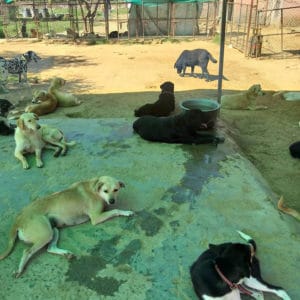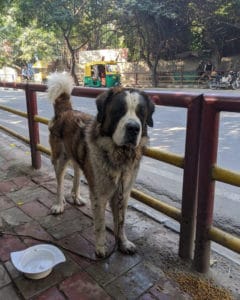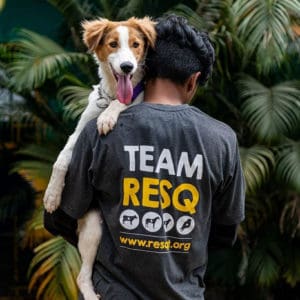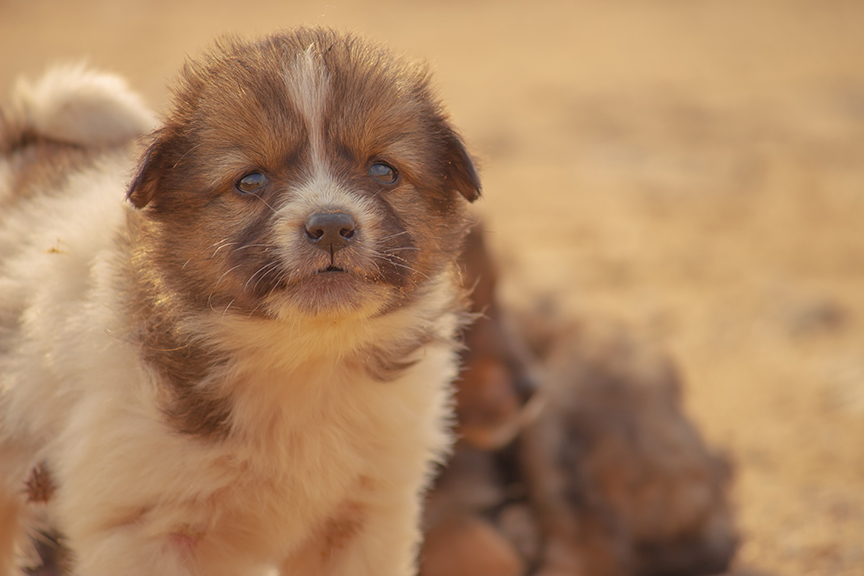The growing spread of misinformation that pets can contract the virus is leading to several cases of abandonment, sometimes at the cost of their lives
Denied food and water, tied up outside the gates of his own home in Gurugram, one-year-old Michael was left abandoned.
Informed about his plight, Umeed for Animals Foundation, a Delhi-based NGO, came to the German Shepherd’s rescue.
On inquiry, it turned out that the owners were present in the house. At first, they denied that he was their pet and claimed ‘someone’ had dropped him there a month back.

Nikhil Mahesh, co-founder of Umeed for Animals Foundation says, “It’s all due to the misinformation being spread that animals spread the virus. They had chained the dog outside their house with a very small chain and someone had alerted us. We immediately rescued him. The owners kept lying to us.”
While the pet owners initially stated that Michael wasn’t theirs, they later on went on to say that he was giving to biting humans. However, the volunteers figured out that they had physically distanced him fearing the spread of the virus.
Michael is not the only one. The group has already rescued seven abandoned dogs, across Delhi. “Even before the lockdown, the moment the misinformation began circulating that animals are spreading the virus, people started abandoning their pets. It started with a Saint Bernard in Saket. There was also a case of an abandoned pregnant Labrador who had to be rescued from Gurgaon,” explains Mahesh.
These rescued dogs are not being put up for adoption as of now. “However, they are open for foster care” adds Mahesh.

While the news of a tiger testing positive at Bronx Zoo is making headlines, one must keep in mind that there is no evidence of companion animals as a source of spreading infection. According to the United States’ Centres for Disease Control and Prevention, “Some coronaviruses, such as canine and feline coronaviruses, infect only animals and do not infect humans. CDC is aware of a very small number of pets, including dogs and cats, outside the United States to be infected with the virus that causes Covid-19 after close contact with people with Covid-19. To date, there is no evidence that pets can spread the virus to people.”
Unlike Michael, some others were not this lucky. Three dogs were abandoned in an apartment in Pune without food and water for days, while their owners had fled. Resq Charitable Trust, an NGO based in Pune, was alerted about this. Unfortunately, one of the dogs, a pug, had passed away. The other two – a Golden Retriever and a Labrador — could be rescued.
“By the time we reached, one was dead and the other two were in a miserable state. One of them had a clay water jar stuck to his face. He was perhaps so thirsty that he put his head inside but got stuck,” says Tuhin Satarkar of Resq.
One of the major rescue and rehabilitation groups for animals in Pune, they have rescued around 100 animals since the lockdown.
Not just dogs, several other companion animals are suffering as well. “Just today we were informed that someone left nine rabbits in a cage on the road. We have rescued all of them,” adds Satarkar.
Apart from rescue work, the NGOs are also feeding stray animals. “We did a fundraiser to raise money for food, and as of yesterday we have distributed two tonnes of dog food in the city,” says Satarkar.

Distributing food across the Capital, Umeed for Animals Foundation is also trying to feed as many animals possible. They are making efforts to identify corporate areas which are now fully vacated. “The residential areas would somehow be looked after, but the animals in corporate areas are all starving,” adds Mahesh stating that while the food isn’t sufficient, they are still managing.
According to a 2019 data, India has over 2.5 crore pet animals. Another report suggests that India has over 3 crore stray dogs.
The unavailability of animal food is also posing a big problem for pet owners. While the condition is better in Tier 1 cities, the situation is still poor in other areas with prices also shooting up.
“The Union government in the MHA guidelines had issued that animal food is an essential item, they had given a further clarification stating that wherever animal food has to be transported interstate it has to be allowed. Now it’s the responsibility of individual states to ensure that the last mile connectivity is covered, supplies maintained, and shops selling these items are allowed to open,” explains Gauri Maulekhi, trustee at People for Animals, an NGO founded by Maneka Gandhi.
However most state governments especially at Tier 2 cities, “are failing to maintain these and it’s causing panic among pet owners and gaushalas, where food is running out. State government and district administration must not only ensure supply but also keep a tab on prices, which at this point of time are rising exponentially,” she adds.
While previously, animal food was lying at the ports, the problem now is that of the last mile.
“We understand that the state government and district administration are overburdened with work but this aspect can be dealt with by the animal husbandry department. Only if they make use of the department for the purpose that is intended, this will be sorted.”





